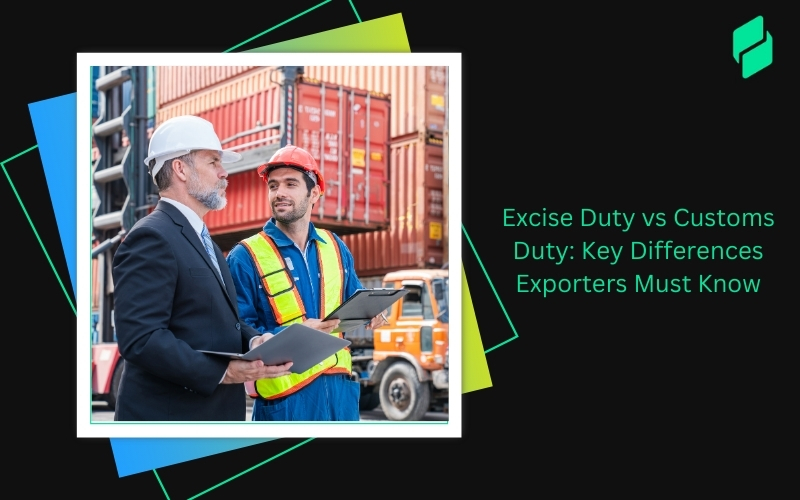Optimize your business: use unlimited savings with Pazago fulfilled now!
Get Started ->If you’ve ever skimmed through an international shipping invoice and felt confused by cryptic three-letter codes. Incoterms like DDP, EXW, or CIF may appear harmless abbreviations, but each one conceals a complex web of responsibilities and costs.
According to the International Chamber of Commerce, misunderstandings of Incoterms remain one of the top reasons for delays and disputes in international shipping. Delivered Duty Paid (DDP), with its high seller responsibility, is often at the center of these challenges.
Let’s break down one of the most common and often misunderstood Incoterms, which is DDP.
What does DDP mean in shipping? Who pays for what? And why do some merchants swear by it while others steer clear?
TL;DR
- Under Delivered Duty Paid, the seller manages everything from export and import duties, customs clearance, freight, and local delivery until the goods reach the buyer’s location.
- DDP minimizes buyer effort and risk. It's ideal for e-commerce, new market entries, or customers with limited trade experience.
- Sellers face cost uncertainty, liability for delays or damage, and regulatory complexity in the buyer’s country. Proper planning and support are essential.
- Use DDP when you want complete control over the delivery experience and have the resources to manage customs and last-mile logistics.
What is DDP (Delivered Duty Paid)?
Incoterms DDP meaning refers to Delivered Duty Paid, one of the 11 official Incoterms rules defined by the International Chamber of Commerce (ICC). Under DDP, the seller takes full responsibility for delivering the goods to the buyer’s location, covering all costs and risks involved in the shipping process. This includes export and import duties, freight charges, insurance, customs clearance, and final delivery to the agreed destination.
In other words, the seller bears the maximum obligation under this term, making it the most buyer-friendly Incoterm. The buyer’s only responsibility is to receive the goods.
Key Components of DDP (Delivered Duty Paid)
Delivered Duty Paid (DDP) is one of the most comprehensive Incoterms for sellers, as it covers the entire logistics process. The key components that define a DDP agreement include:
- Transfer of Risk: Risk remains with the seller until the goods are delivered to the buyer's named place of destination. Any loss or damage during transit is the seller’s responsibility until final delivery.
- Cost Allocation: The seller bears all costs involved in transporting the goods, including export and import duties, taxes, and freight. The buyer does not pay anything beyond the agreed purchase price.
- Customs Obligations: The seller handles both export and import customs clearance. This includes securing export permits, filing import declarations, and covering related fees or delays.
- Delivery Location: Delivery is completed when the goods are made available to the buyer at the agreed destination. This could be a warehouse, office, or any other specified site in the buyer’s country.
- Import Compliance: The seller is responsible for ensuring the goods meet the regulatory requirements of the importing country, including product standards, labeling, and documentation.
- Tax and Duty Management: DDP includes the payment of VAT, import duties, and other local charges in the destination country. This simplifies the process for the buyer, especially in regions with complex tax systems.
In short, DDP defines a trade structure where the seller manages the entire shipping process, both financially and logistically, until the goods reach the buyer’s doorstep.
Also Read: Meaning and Process of DDP Shipping and its Importance for Business.
Responsibilities Under DDP

Under the DDP Incoterm (Delivered Duty Paid), the seller assumes maximum responsibility in the shipping process. The seller delivers the goods to the buyer at the named destination, with all costs and risks covered, including import duties and taxes. Here's a detailed breakdown:
Seller’s Responsibilities:
- Export Packaging: Properly pack goods according to the destination country's standards.
- Export Licenses & Documentation: Handle all export formalities, including licenses, permits, and customs documentation.
- Loading at Origin: The seller is responsible for loading goods onto the first carrier, covering related expenses.
- Inland Transport in Export Country: Covers domestic transport from the seller’s premises to the port or terminal.
- Export Customs Clearance: Handle customs procedures and pay applicable export duties and taxes.
- Main Carriage (International Freight): Book and pay for the primary transportation (e.g., air, sea, rail, or road) to the destination country.
- Insurance (Optional but Recommended): Although not mandatory under DDP, the seller is recommended to insure the goods during transit.
- Import Customs Clearance: Take full responsibility for import customs, including all duties, taxes, and compliance with local regulations.
- Inland Transport in Import Country: Covers the cost and risk of transporting the goods within the buyer’s country to the final destination.
- Unloading at Destination (If Agreed): If specified in the contract, also cover unloading at the buyer's premises.
Buyer’s Responsibilities:
- Provide Necessary Information: Share the required documents or data for smooth customs clearance.
- Accept Delivery: Receive the goods at the agreed-upon location once all seller obligations are met.
Suggested Read: How to Calculate Duty Drawback on Export: Pazago Guide
When to Use DDP?
Delivered Duty Paid (DDP) is best suited when the seller wants full control over the shipping process, and the buyer expects a hassle-free delivery experience. It’s especially effective in the following scenarios:
- New Market Entry: When a seller enters a foreign market, it aims to minimize friction for the buyer. Offering DDP eliminates import-related responsibilities on the buyer’s side, which builds trust and encourages sales.
- E-commerce & B2C Sales: In direct-to-consumer models, buyers often lack the knowledge or capacity to deal with customs clearance, duties, and local taxes. DDP ensures a smooth delivery experience.
- High-Value or Sensitive Goods: For shipments where delays, miscommunication, or compliance issues could significantly increase costs or risks, DDP allows the seller to manage the process from origin to destination.
- Customer-Centric Strategy: Businesses seeking to differentiate themselves in service can utilize DDP to offer a comprehensive delivery solution. This is particularly useful in competitive or service-driven industries.
- Buyers with Limited Trade Experience: When dealing with customers unfamiliar with international logistics or customs regulations, DDP simplifies the process and minimizes clearance issues.
However, DDP comes with added risk and responsibility for the seller, including import duties, local taxes, and regulatory compliance in the buyer’s country. It is therefore crucial to assess local laws, costs, and potential delays before offering this term.
You Might Also Like: Understanding Delivered Duty Unpaid (DDU): Definition, Meaning, And Differences In Shipping Terms
Who Uses DDP?
Delivered Duty Paid (DDP) is used by businesses that want to simplify the shipping process for their buyers. Common users include:
- Exporters Entering New Markets: To attract international buyers, exporters often utilize DDP to cover all shipping and customs costs upfront, thereby simplifying the purchasing process.
- E-Commerce Retailers: Online sellers offer DDP to avoid surprise charges for international customers, reducing cart abandonment and boosting satisfaction.
- Dropshipping and Fulfillment Services: These businesses rely on DDP to ensure a smooth delivery experience and maintain control over customer expectations.
- B2B Sellers of High-Value Goods: Companies selling machinery or equipment use DDP to simplify logistics and reassure buyers about total landed costs.
- Businesses Shipping to Complex Markets: When shipping to countries with strict customs or unpredictable duties, DDP helps avoid delays and paperwork issues.
- Luxury and Premium Brands: High-end retailers utilize DDP to offer a smooth, worry-free experience that aligns with their premium customer service standards.
Also Read: Understanding DAP Incoterms and Delivered at Place Details
Advantages of DDP
Here are several important advantages and benefits to consider when using the DDP (Delivered Duty Paid) Incoterm in international trade transactions:
- Buyer Convenience: The buyer receives the goods without having to deal with customs, taxes, or local logistics. This is particularly useful for buyers unfamiliar with international trade regulations or the importing process.
- Streamlined Shipping Experience: The seller manages the entire shipping process, resulting in fewer delays, miscommunications, or customs surprises.
- Cost Transparency for Buyers: Buyers receive an all-inclusive landed cost upfront, with no hidden duties or fees upon arrival. This simplifies budgeting and price comparison.
- Stronger Seller Control: Sellers retain control over the logistics chain, choosing reliable carriers, handling customs paperwork, and ensuring timely delivery.
- Improved Customer Experience: For B2C businesses or global e-commerce sellers, DDP enhances customer satisfaction by making international delivery smooth and predictable.
Suggested Read: Understanding Incoterms in International Trade
Disadvantages of DDP
While Delivered Duty Paid (DDP) terms offer significant convenience and simplicity for buyers by transferring most responsibilities and risks to the seller, this arrangement can present several logistical, financial, and compliance challenges for sellers.
- Higher Risk and Responsibility for the Seller: The seller is responsible for the entire shipping process, including customs clearance and import duties. This increases exposure to delays, penalties, and unexpected issues.
- Complex Customs Procedures: Navigating foreign customs can be challenging if the seller lacks local knowledge or experience. Mistakes can lead to fines or shipment holds.
- Unpredictable Costs: Import taxes and fees vary by country and can change without notice. This makes it difficult for sellers to estimate total landed costs accurately.
- Limited Control Over Local Delivery: Final-mile logistics often require local coordination. Without local partners, managing delivery can be inefficient or unreliable.
- Cash Flow Strain: The seller must cover all logistics expenses upfront, including duties and taxes, as well as any other associated costs. This can create cash flow issues, especially for large or frequent shipments.
- Liability Issues: The seller is liable for the goods until final delivery. Any damage, loss, or delays fall on the seller’s shoulders.
- Not Ideal for High-Risk or Restricted Markets: In regions with strict import controls or unstable regulations, DDP can be impractical. Sellers may face legal complications or compliance risks they can’t easily manage.
Now that we know everything about DDP, from its meaning to its advantages and disadvantages and when it is used, let us find out how Pazago helps businesses manage DDP.
You Might Also Like: Understanding Incoterms: Carriage Paid To (CPT) Usage and Meaning
How Pazago Helps You Manage DDP Shipments End-to-End

Taking complete control of cross-border deliveries demands precision, coordination, and the right digital support. For businesses managing DDP shipments, the challenge isn’t just about getting goods across borders. It is about doing so with complete visibility, accuracy, and compliance at every stage. This is where Pazago makes a difference.
DDP requires constant monitoring from origin to destination. Pazago’s real-time tracking tools provide sellers with complete visibility over their shipments, enabling them to anticipate delays, reroute if necessary, and update buyers proactively.
Incomplete or incorrect paperwork can cause a DDP shipment to be halted at customs. Pazago enables centralized document management, making it easy to generate, verify, and submit customs forms that meet the requirements of the destination country.
DDP often involves coordinating with multiple carriers across borders. Pazago helps sellers manage carrier schedules, consolidate shipment updates, and ensure smooth handoffs from freight forwarders to last-mile providers.
The seller is responsible for the goods until final delivery. To safeguard against liability, Pazago provides access to shipment insurance and supports claims processing, thereby reducing financial exposure in the event of loss or damage.
Buyers expect updates without handling logistics. Pazago’s platform allows sellers to send branded tracking notifications and delivery updates, offering a buyer-friendly experience while keeping backend operations in sync.
By managing paperwork, tracking, insurance, and compliance, Pazago supports businesses that assume DDP responsibilities. This helps sellers maintain control over their shipments and build trust with international buyers.
Conclusion
The Incoterms DDP meaning isn’t just about “Delivered Duty Paid.” It represents a shipping model where sellers handle everything from export and import duties to final delivery, ensuring a smooth experience for the buyer.
But with greater control comes greater responsibility. Managing DDP efficiently requires accurate documentation, real-time tracking, and tight coordination. That’s where Pazago helps. With centralized tracking and automated workflows, Pazago simplifies DDP logistics and gives businesses full visibility into every shipment.
Considering DDP for your global deliveries? Learn how Pazago can support your operations. Book a demo today and discover how we can enhance your cross-border shipping efficiency.
FAQs
1. What does DDP mean in Incoterms?
Ans. DDP stands for Delivered Duty Paid. Under this term, the seller assumes full responsibility for delivering goods to the buyer’s location, including all costs, duties, and taxes.
2. Who is responsible for customs clearance in DDP shipping?
Ans. The seller handles both export and import customs clearance. This includes paying any duties or taxes required by the destination country.
3. When should businesses use DDP?
Ans. DDP works best when the seller has experience managing international logistics and wants to offer a smooth buying experience. It's commonly used in e-commerce or when entering new markets.
4. What are the risks for sellers under DDP?
Ans. Sellers face higher risks, including unexpected customs charges, delivery delays, or regulatory issues in the buyer’s country.
5. How does DDP compare to DAP or EXW?
Ans. Unlike DDP, where the seller covers all costs, DAP (Delivered at Place) requires the buyer to handle import duties and taxes. EXW (Ex Works) places nearly all responsibility on the buyer, including export formalities and documentation.


.png)


%20Explained.jpg)





